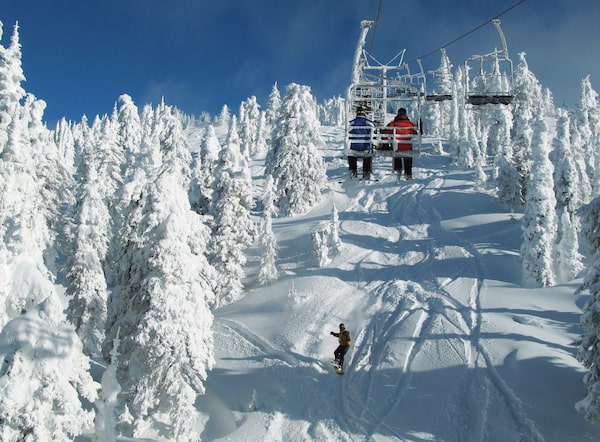
Ski resorts and businesses in B.C. are bracing for possible confrontations as Alberta lifts health mandates.JACQUES BOISSINOT/The Canadian Press
As Alberta begins to roll back COVID-19 restrictions at a faster pace than most other places in Canada, tourism and hospitality businesses in British Columbia frequented by travellers from across the provincial boundary say they’re worried about an increase in customers ignoring or being unaware of health restrictions.
Alberta abruptly ended its vaccine passport system earlier this week, arguing that the measure was no longer needed as a fifth wave of infections driven by the Omicron variant recedes, although a provincial mask mandate will remain in place until the end of the month. Saskatchewan is lifting its vaccine passport system this weekend and Manitoba intends to follow in March, while B.C. has made it clear its rules around vaccines and masks will remain in place for the foreseeable future.
Albertans make up a sizeable proportion of visitors to many of B.C.’s tourist destinations, particularly in ski towns such as Golden and Fernie, as well as the Okanagan. As the two jurisdictions diverge in their approach to COVID-19, B.C. restaurants and ski resorts say they expect most customers to be respectful of the rules, but are preparing for potential conflict.
Michael J. Ballingall, senior vice-president at Big White Ski Resort near Kelowna, B.C., said that while the majority of visitors follow the rules in place, the occasional argument about masking measures or proof of vaccination does occur.
“We have some people that want to show their licence on their phone. That’s not the rule in British Columbia, you have to have a piece of photo ID,” Mr. Ballingall said, adding that the resort has made an effort to ensure all public health measures have been met in the past and will continue to enforce proof of vaccination and masking requirements.
Alberta, Saskatchewan move to end COVID-19 restrictions
“There’s no debate here. Go away, get your photo ID, come back or just go home. We’re not bending the rules for anybody.”
He noted that about 20 per cent of the resort’s visitors are from Alberta, and many from that province own second homes in the Okanagan Valley or other parts of Interior B.C.
“Alberta just seems to be that much more relaxed than B.C.,” Mr. Ballingall said. “Some of the people that are here from Alberta, they come here to get away from it all, and they think because they’re outside, everything’s relaxed.”
Ron Oszust, the Mayor of Golden, which is located about a three-hour drive from Calgary and is home to the popular Kicking Horse Mountain Resort, said he doesn’t anticipate any tension between visitors and locals.
“The community and the visitors have done a great job at adapting to the situations, and visitors, for the most part, have been very, very respectful of the restrictions that we have in place here.”
But he acknowledged that front-line staff may face a difficult task.
“They have to be that person, to stand in front of somebody and say these are our policies, these are practices and please comply or you aren’t able to do business here,” Mr. Oszust said. “That’s a tough position to be in, absolutely.”
Some restaurant staff are bracing for more conflict
Petra Nott, owner of Island Restaurant in Golden, said her staff have already experienced an increase in hostility over the past week.
“We’ve already seen it with the truck convoy,” Ms. Nott said. “It’s brought back the people that are kind of rude to you and feeling a bit enabled from the protests. ... We’ve gone probably quite a few months with no one being rude to us coming in. And then last week, there were three that were giving us a bit of a hassle even though they had their passports.”
About half of the restaurant’s customers are typically from Alberta, she said, and while most visitors follow the rules, there are always “a few” who do not.
“When the vaccine passport first came into effect there was quite a bit of resistance from Alberta. But I would say the majority of them knew and had their paperwork ready,” Ms. Nott said.
“We’ll just have to, perhaps, invest in some more disposable masks to give out to people. I’m just hoping most of them are pretty good.”
The BC Restaurant and Foodservices Association said its members are preparing to deal with a small number of conflicts and disputes from unruly customers.
Ian Tostenson, president and chief executive officer of the association, said restaurants in the Okanagan Valley and regions near the B.C.-Alberta border already dealt with these kinds of conflicts last summer and autumn, when Alberta first dropped most COVID-19 restrictions and took longer than other jurisdictions to implement a vaccine passport.
The masking mandates and vaccine passport requirements were the biggest source of friction, he said.
“In most cases it’s just a communication issue. People go, ‘What do you mean I can only have six people at a table?’ or ‘What do you mean I have to wear a mask?’” Mr. Tostenson said.
“When they understand that we’re following health orders and not just making this stuff up, they’re fine.”
He added that it’ll take some time before tourism from Albertans ramps up, at which point B.C. will likely have rolled back some of its measures as well.
He is pleased the province is taking a more cautious approach to dropping public health measures, and that B.C. has been able to keep restaurants safe from lockdowns more successfully than many other North American jurisdictions.
“That says something about the way things were done here,” said Mr. Tostenson, who called Alberta’s direction “not the lead we want to follow.”
We have a weekly Western Canada newsletter written by our B.C. and Alberta bureau chiefs, providing a comprehensive package of the news you need to know about the region and its place in the issues facing Canada. Sign up today.
 Salmaan Farooqui
Salmaan Farooqui